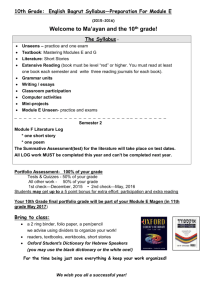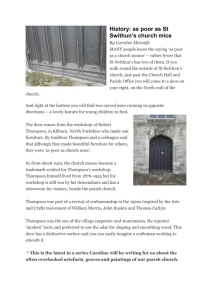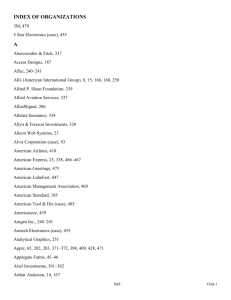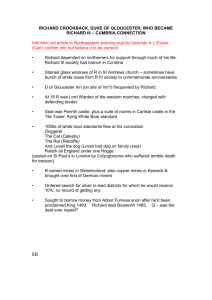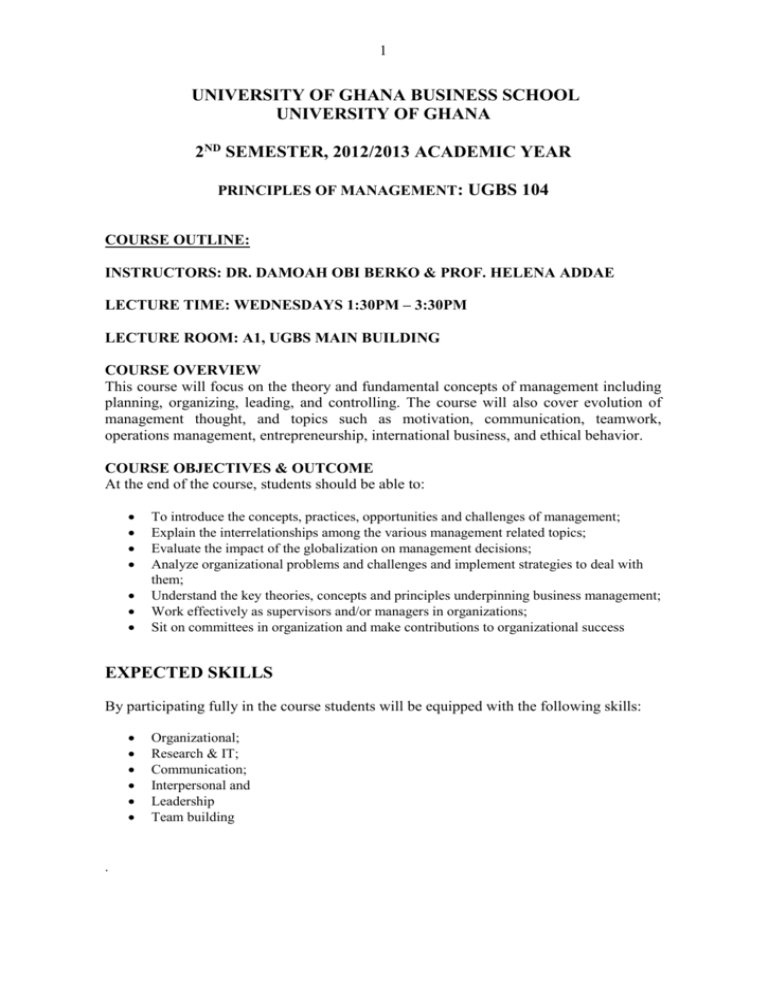
1
UNIVERSITY OF GHANA BUSINESS SCHOOL
UNIVERSITY OF GHANA
2ND SEMESTER, 2012/2013 ACADEMIC YEAR
PRINCIPLES OF MANAGEMENT: UGBS 104
COURSE OUTLINE:
INSTRUCTORS: DR. DAMOAH OBI BERKO & PROF. HELENA ADDAE
LECTURE TIME: WEDNESDAYS 1:30PM – 3:30PM
LECTURE ROOM: A1, UGBS MAIN BUILDING
COURSE OVERVIEW
This course will focus on the theory and fundamental concepts of management including
planning, organizing, leading, and controlling. The course will also cover evolution of
management thought, and topics such as motivation, communication, teamwork,
operations management, entrepreneurship, international business, and ethical behavior.
COURSE OBJECTIVES & OUTCOME
At the end of the course, students should be able to:
To introduce the concepts, practices, opportunities and challenges of management;
Explain the interrelationships among the various management related topics;
Evaluate the impact of the globalization on management decisions;
Analyze organizational problems and challenges and implement strategies to deal with
them;
Understand the key theories, concepts and principles underpinning business management;
Work effectively as supervisors and/or managers in organizations;
Sit on committees in organization and make contributions to organizational success
EXPECTED SKILLS
By participating fully in the course students will be equipped with the following skills:
.
Organizational;
Research & IT;
Communication;
Interpersonal and
Leadership
Team building
2
TEACHING METHOD/PROCEDURE
Lectures
Case studies
Group and individual assignments
Field work
TEACHING MATERIALS
Lecture slides
Recommended Textbooks
The Worldwide Web
Journal of Articles
3
COURSE CONTENTS
Weeks
1
Date
Jan. 30, 2013
Lecture/Topic (s)
Venue
A1
Readings
Richard L. Daft,
Management, 10th
Edition, 2012,
Thompson
Publishing
Ch. 2
do
Richard L. Daft,
Management, 10th
Edition, 2012,
Thompson
Publishing
Ch. 2
Management, Nature &
Purpose:
Introduction to Commercial
Organizations
Definition of management
Managers and organizations
Management
&
Administration
The management Process
Levels of managers
Managers and their types
Management roles
Management as universal
process
Essential Managerial skills
Managerial Performance
2
Feb. 06, 2013
Evolution of Management
Thinking - I
A) Classical viewpoint:
Scientific management
Bureaucratic management
Administrative management
Assessment
4
B) Behavioural Viewpoint:
Early behaviourists
Hawthorne Studies
C)
Human
relations
movement:
Maslow’s theory of needs
McGregor’s Theory X and Y
3
Feb. 13, 2013
do
Richard L. Daft,
Management, 10th
Edition, 2012,
Thompson
Publishing
Ch. 2
The
Environment
of do
management
External environment
Internal environment
Environment and Corporate
culture
Managing in a Global
Richard L. Daft,
Management, 10th
Edition, 2012,
Thompson
Publishing
Ch. 3 & 4
Evolution of Management
Thinking - II
D)
Quantitative
management Viewpoint:
Operations management
Management science
Management
information
systems
Contemporary viewpoints:
Systems Theory
Contingency theory
4
Feb. 20, 2013
5
Climate
5
Feb. 27,2013
6
Mar. 06, 2013
7
Mar. 13, 2013
Organizational Climate: do
Individual
&
group
behaviour
Organizational culture
Committees in business
organizations
Planning and Decision do
making
Definition of planning
Benefits of planning
Planning process
Types of planning
Decision making process
Organizing
and do
Organizational
Structure
Defining concepts
Organizational Design:
Work specialization
Departmentalization
Chain of Command
Span of Control
Centralization
and
decentralization
Formalization
Richard L. Daft,
Management, 10th
Edition, 2012,
Thompson Publishing
Ch. 6
Richard L. Daft,
Management, 10th
Edition, 2012,
Thompson Publishing
Ch.7, 8 & 9
Richard L. Daft,
Management, 10th
Edition, 2012,
Thompson Publishing
Ch.10, 11, 12 & 13
Interim Assessment
– 30%
6
Types of organizational
design
8
Mar. 20, 2013
Controlling
Internal control
External control
Control mechanisms
do
Mar. 27, 2013
Leading
The Meaning of
Leadership
Approaches to
leadership:
Trait Approach
Behavioural Approach
Contingency Approach
Leadership processes
Power & Authority
Leadership Styles
do
9
Continue from the next page
Richard L. Daft,
Management, 10th
Edition, 2012,
Thompson Publishing
Ch.19
Richard L. Daft,
Management, 10th
Edition, 2012,
Thompson Publishing
Ch.14, 15, 16, 17 & 18
7
10
Apri. 03, 2013
Organisational
Communication
do
Richard L. Daft,
Management, 10th
Edition, 2012,
Thompson
Publishing
Ch. 18
do
Richard L. Daft,
Management, 10th
Edition, 2012,
Thompson
Publishing
Ch. 6
Richard L. Daft,
Management, 10th
Edition, 2012,
Thompson
Publishing
Ch. 5
Definition and Importance
of Communication
Model of Communication
Communication media
Types of Communication:
Communication Skills
Barriers
to
Effective
Communications
Improving communication
11
12
Apri. 10, 2013
Management of SMEs
Apri. 17, 2013
Corporate
Responsibility
Ethics
Social do
and
Definitions
of
social
responsibility and ethics
Areas
of
social
responsibility
Stakeholder theory
Elements of business
ethics
Ethical dilemmas at work
8
Managing ethics at work
13
Apri. 24, 2013
14
Revision
15, 15 & 17
Summary and Synthesis
Field Work Report
Presentations
do
Richard L. Daft,
Management, 10th
Edition, 2012,
Thompson
Publishing
Ch. 1-18
70 %
Examination
9
REFERENCES:
Required Text: Richard L. Daft, Management, 10th Edition, 2012, Thompson Publishing
Recommended
Bartol K.M and Martin D.C (1998) Management, 3rd Edition, McGraw-Hill, New York
Robbins, P.S and Coulter, M., (2007) Management, 9th Edition, Pearson Prentice Hall,
USA
Robbins, P.S and DeCenzo, D.A., (2005) Fundamentals of Management, 5th Edition,
Pearson Prentice Hall, USA
Schermerhorn J.R (2008) Management, 8th Edition, John Wiley & Sons, Incorporated,
USA.
In addition, any good introductory text in Management is highly recommended.
In addition:
Any good introductory text in Strategic Management/Business Policy
Business section of any newspaper
Strategic Management publications (consult the library).
Class Participation
Be prompt for all classes.
A great deal of valuable learning takes place through discussion of the course
topics. You are expected to attend all classes and participate in the class
discussions regularly.
You are expected to stay current with business news that relates in some way to
the course content through available media: newspapers, radio, TV and the
Internet.
EVALUATION
Group Assignment
End of Semester Exam
30%
70%
Assignments
Individual Project
Informational Interview: You will contact an employee with supervisory responsibilities
in any organization of your choice. Write a 2 page summary of the interview, including
answers to the list of specific questions you used for the interview and a one page
analysis of the organization this supervisor works with. In your analysis, consider factors
such as the industry the organization involved in; the number of employees it has; is it a
national or international organizational; who are their competitors etc?
A business card should be included with the report. Use this as an opportunity to connect
with someone who has a job you would like - make a connection and network!
10
Group Project
Setting up your own organization: Set up any organization of your choice. Select a name
for your company. Find out how to register your company as a legal entity. What
product(s) or services will your company offer? What departments would your
organization have and why? How many employees do you anticipate to have in each
department and why? Provide a job description for one employee in each department.
Provide an organizational chart depicting working relationships in your chosen
organization.
Your project report should be 10 double-spaced (font12) type-written pages (excluding
appendices, tables and references).
PASTORAL DETAILS
1) Professor Helena Addae
Office Location
: 2nd Floor, Graduate Block, Room GB S7 (Outer)
E- Main
: addaeh@uww.edu
Consulting Hours
: Wednesday 12 midday – 2:00pm
2) Dr. Damoah Obi Berko
Office Location
: 3rd Floor, Graduate Block, Room GB S.13 (inner)
Office Hours
: Mondays & Tuesdays 12:00 pm – 2.00 pm
E-mail
: obiberko@yahoo.com/obodamoah@ug.edu.gh
11


